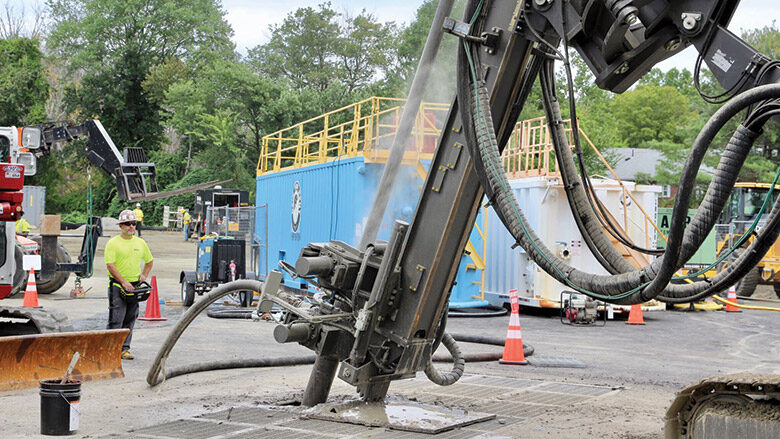
Nikki Bruno: Massachusetts Utility Commissions First U.S. Geothermal Network Linking Residential and Commercial Buildings in an Urban Neighborhood

When interviewing to work for Eversource Energy in 2020, Nikki L. Bruno was asked if she had experience in the geothermal field. Bruno said no, but offered that she’d taken geology classes and could learn.
About four years later, the Massachusetts utility’s vice president of clean technologies ran Eversource’s effort to commission a first-in-the-nation utility-led thermal energy network in a densely populated mixed-use neighborhood. In June, the pilot project in Framingham, Mass., connected 24 single-family homes, 100 city housing apartment units, some public structures and five commercial buildings to collectively provide 135 total customers with heating and cooling from a renewable source. “When you’re writing an RFP for contractor and consultant help, and you have never lived through that work,” Bruno says, “it’s a little intimidating.”
Now utilities from around the globe are looking to Bruno’s team for geothermal guidance. Climate advocates are even working with Eversource. The Dept. of Energy in December pledged $7.8 million to an advocacy group, HEET, partnering with Eversource and Framingham to advance the project’s second phase. The funding, yet to be finalized at press time, would help double the existing pilot. “We’ve become this leader in the nation on that front,” Bruno says. “But, in a collegial way, a humble way, because we’re saying, ‘We’re trying to figure it out, too,’ and it fostered this open dynamic.”
Bruno is also working toward a model that allows such networks to operate without relying on subsidies, tax credits and DOE funding that could dissipate during the Trump administration. “The goal is to make it sustainable on its own,” she says, by “doing the hard commercial math to see how we can set this up so we could move this forward at a cost-effective rate, a cost-effective capital investment for businesses, as soon as we can, so we’re not beholden to some of those funding opportunities or tax credits.”
Eversource was well positioned for the project, not just because it’s skilled at installing underground pipeline, but also because working with different types of building owners requires infrastructure such as billing systems. It also knew how to navigate permitting and siting while bringing various stakeholders to the table. Bruno says her team’s “technical knowledge” helps it manage and execute projects, along with its “emotional IQ and leadership capabilities” around customer and community dynamics. “There’s a lot of translatable skills that we already have,” she says. “It’s just a different technology.”

Photo courtesy Eversource
Daniel Flaherty, a mechanical engineer at CDM Smith, the project’s design engineer of record, said Bruno synthesizes information and communicates it “internally and externally in ways that people can understand.”
He added, “Building energy transition infrastructure requires bringing many perspectives and opinions together to agree on a way forward, and ultimately her success in doing that is what has helped this project get built.”
Moving forward, Eversource says it will work to determine if utility-scale geothermal networks can “feasibly and affordably” be expanded or replicated in other “densely populated and mixed-use areas of New England” after it finishes analyzing the network’s performance during two heating and cooling seasons. The pilot will help determine if such a system can replace legacy energy sources—such as natural gas, air-source heat pumps or delivered fuels like heating oil and propane—or be used in tandem with existing heating and cooling systems.
“We cannot fail this project,” Bruno says. “We have to succeed by any and all efforts, because this is really an inflection point for what the gas company can be—a thermal company in the future.”
Post a Comment
You must be logged in to post a comment.





